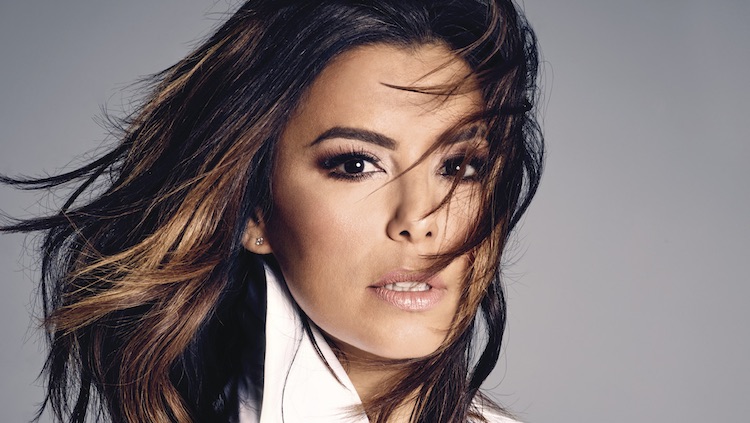There’s Her Work, And Her Life’s Work

The smarter way to stay on top of broadcasting and cable industry. Sign up below
You are now subscribed
Your newsletter sign-up was successful
It seems inconceivable that there was ever a time when Eva Longoria—a most welcome television industry fixture and star—wasn’t ready-made for her close-up. But when she was a child, the woman who thrilled for nearly a decade on Desperate Housewives and who remains a sought-after producer and director and lauded philanthropist hadn’t planned on any of this.
“I didn’t grow up with this dream,” she says, recalling an academic upbringing where she was “the last person in my family to get my master’s; I’m the underachiever in the family. ‘TV? Really? Acting? OK,’” she suggests was the reaction. But while she didn’t watch much on the black-and-white TV at home as a kid, what she saw was good, foundational stuff—the Disney Sunday Night Movie, The Jeffersons, Three’s Company, “basic, simple formulas that still hold up today.” Longoria also saw the power of what she calls “the greatest medium of entertainment,” and after college she stood in Hollywood and simply decided to become an actress. “There was no build-up; it was literally one day and I just said it,” she says, before applying both her academic principles and dogged determination to the pursuit.
Longoria’s decision has been a boon not only for fans of scene-stealing performances but, more importantly, for a Hispanic entertainment community that benefits both from good role models and dedicated mentors. Her career as a hyphenate is significant for its accomplishment but more importantly for what it represents. What it adds up to is passion, vision and leadership—the core pillars of the Brandon Tartikoff legacy.
“She knows our industry hasn’t had a lot of doors open for young women or people of color and she sees herself along the lines of, ‘How many more people can I get up on the platform with me?’” says Christy Haubegger, veteran CAA agent and former CEO of Latina magazine.
For Longoria, an early star turn in The Young and the Restless and other TV work led not long after to Desperate Housewives where, alongside Teri Hatcher, Felicity Huffman and Marcia Cross in Marc Cherry’s multiple Emmy and Golden Globe-winning series, she helped redefine the cultural narrative.
“The most exciting thing was its immediate global success—not only in the U.S. but everywhere we went, it was like the Beatles,” she says of the attention the series generated. “It really resonated with women everywhere because of the universal themes it dealt with—motherhood, marriage, divorce, neighborhoods and neighbors, what you don’t know and what you think you know. I loved every minute of it and I owe everything to Mark Cherry. Desperate Housewives was like film school for me.”
Longoria understood that a successful series and a name as a bankable performer meant she could pursue two other opportunities even closer to her heart—work behind the camera as a producer/director, and the creation of philanthropic and mentoring concerns to bring attention to issues closer to her heart. With a sister with special needs and another sister and her mom both special needs teachers, Longoria was raised with philanthropy in her DNA.
The smarter way to stay on top of broadcasting and cable industry. Sign up below
The Eva Longoria Foundation uses education and entrepreneurship to help Latinas build better futures for themselves and their families. Eva’s Heroes, which Longoria established in 2006, helps teens and young adults with intellectual special needs integrate into and flourish in society; to date, Longoria has helped raise more than $2.1M for the organization. These and many other commitments have earned her a number of humanitarian and philanthropic awards throughout the industry, and a reputation for recognizing that lip service never cuts it. “There’s her work,” says Haubegger, “and then there’s her life’s work.”
“I started my foundations because I wanted to make sustainable change,” she says. “We are very focused in our giving and the programs we provide, all within the realm of education for young Latinas and making sure they reach their full potential.”
While Longoria keeps her producing and philanthropic lives separate, a sense of justice is very much at the heart of what she chooses to be involved with. She produced a documentary about the plight of child farm workers and another about the power of the Latino vote. Also, through her Versus banner, part of ESPN’s 30 for 30 series, she produces shorter looks at athletes who overcome various struggles—including racism and sexism—to succeed. Recent directing assignments include series with a big place in her heart—including Jane the Virgin and Black-ish—and she worked both in front of and behind the camera alongside Cherry on the series Devious Maids. In each case, Longoria’s efforts have been a celebration of possibility and commitment.
“It’s a great time for producers and actors,” she says. “With all the opportunities for distribution, everybody is a content creator. You have a lot more possibilities for your content to be seen…. The thing that’s going to stand out, comedy or drama or hybrid, is as long as a show has a strong point of view, you’ll have a good show. Why is a certain family show different? A family show’s not unique, but who tells that story can be.”
In many ways, Longoria counts Tartikoff among her inspirations. “Everybody’s been touched by Brandon,” she says. “If he were alive today, he would be at the forefront of this disruption in television. He’d be doing amazing things. So for me, this is a huge honor.”
Rob has written for Broadcasting+Cable since 2006, starting with his work on the magazine’s award-winning 75th-anniversary issue. He was born a few blocks away from Yankee Stadium … so of course he’s published three books on NASCAR, most notably, Full Throttle: The Life and Fast Times of NASCAR Legend Curtis Turner. He’s currently the special projects editor at TV Guide Magazine. His writing has appeared in The Washington Post and his origami art has been in The Wall Street Journal. He lives with his family in New Jersey and is writing a novel about the Wild West.

